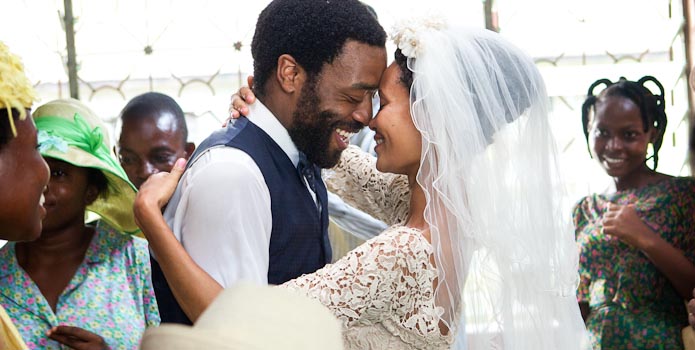TIFF13: Half of a Yellow Sun (2013)
Nigerian playwright Biyi Bandele’s adaptation of Chimamanda Ngozi Adichie’s Biafran War novel, Half of a Yellow Sun, is in many ways a classically composed and executed historical adaptation. Filled with vibrant colours and characters, the film is equal parts entertainment and information, particularly for viewers with little to no knowledge of the war or Nigerian history in general. It seems easy to condemn a film for not being as daring or probing as it could have been, but at the same time there is something to be said for a well made, beautiful-looking film that doesn’t make any major missteps.
In adapting the many threads of the novel (which I haven’t read), Bandele’s film chooses to focus on a pair of twin sisters, Olanna – played by Thandie Newton – and Kainene – American actress, Anika Noni Rose – foreign educated members of the newly established Nigerian state. The film begins on the eve of Nigerian independence in 1960, casting what follows as in many ways the fallout of the end of colonial rule and the mess left behind by retreating foreign powers, eager to re-draw the maps of their former colonies even as they extricate themselves. Olanna takes up a teaching position at a college in Nsukka in order to be with her “revolutionary lover,” as her sister dubs a fellow professor, Odenigbo, portrayed by Chiwetel Ejiofor (who has earned praise from others for his role in Steve McQueens drama, 12 Years a Slave). Kainene assumes responsibility for her father’s manufacturing and business interests in Port Harcourt, at the same time that she rekindles a relationship with an old flame, a English writer named Richard who is also teaching in Nsukka.
What transpires is one of the old strategies of the historical picture. The various characters affairs, spats, and personal lives intertwine with the climactic events shaping the country and find themselves at the mercy of history. When the southern, predominately Igbo states secede and declare themselves the independent Republic of Biafra, Nigeria finds itself in a state of civil war, which rages around the characters and raises the stakes significantly.
Bandele’s condensation of Adichie’s 450-page novel necessarily seems rushed at times with the film’s under two-hour runtime. I have intimated from fans of the novel that John Boyega (who shone in the excellent Attack the Block) as Odenigbo’s servant boy, Ugwu, finds his story arc condensed, but to give credit to Boyega, he still manages to convent the character with depth and affection.
As a playwright adapting a novel to cinema for his first feature film, Bandele can be commended for avoiding many common pitfalls of stage directors, avoiding any kind of stagey feel or static camera, and communicating movement and space clearly and elegantly. As the actors remarked in the brief Q&A after the film, shooting on location in Nigeria lends the film a vibrancy that might not otherwise be achieved. The colours of the clothing and setting stand out against so many dour colour palettes in most Hollywood fare these days.
Although it offers only a surface-level introduction to Nigerian history, Half of a Yellow Sun is still an engaging historical picture that avoids any major missteps, a quality all too rare these days among the prestige literary genre.
7 out 10
Half of a Yellow Sun (Nigeria/UK, 2013)
Written for the screen and directed by Biyi Bandele; based on the novel by Chimamanda Ngozi Adichie; starring Thandie Newton, Anika Noni Rose, Chiwetel Ejiofor, John Boyega.
Half of a Yellow Sun played Sept. 8 and 9 and again on the 14th at the Toronto International Film Festival as part of the Special Presentation programme.
